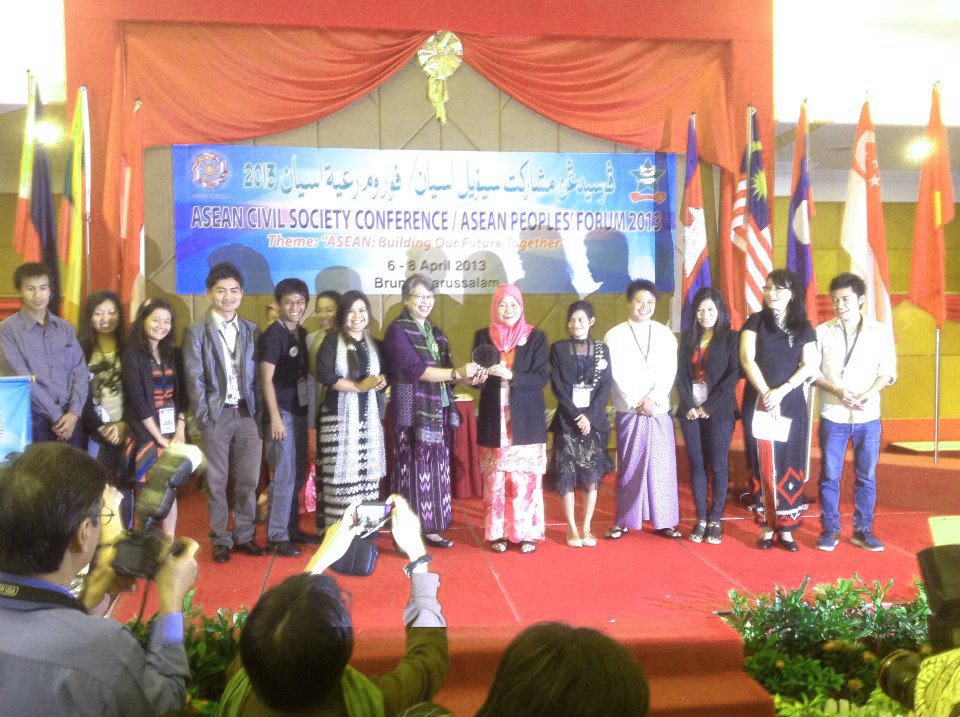ACSC/APF 2014 is Burma’s Chance to Set a Positive Benchmark for ASEAN Civl Society
March 17, 2014 On 21-23 March, the 2014 ASEAN Civil Society Conference (ACSC), otherwise known as the ASEAN People’s Forum (APF), will take place in Rangoon, Burma. The ACSC/APF is held annually by the ASEAN Chair country – currently Burma – in advance of and parallel to the official ASEAN Summit, which will be held in May and attended by ASEAN and regional leaders.
On 21-23 March, the 2014 ASEAN Civil Society Conference (ACSC), otherwise known as the ASEAN People’s Forum (APF), will take place in Rangoon, Burma. The ACSC/APF is held annually by the ASEAN Chair country – currently Burma – in advance of and parallel to the official ASEAN Summit, which will be held in May and attended by ASEAN and regional leaders.
The ACSC/APF is the showcase event for the ASEAN civil society community. Civil society actors from across the ten ASEAN countries, as well as Timor Leste, and beyond will be coming to Rangoon to attend a range of programs, events and workshops on a variety of ASEAN issues. Their mandate is to represent the voices of the people of ASEAN. The theme of this year’s ACSC/APF is “Advancing ASEAN People’s Solidarity toward sustainable peace, development, justice and democratization”.
In October 2013, at the end of the most recent East Asia Summit, when President Thein Sein accepted the gavel that symbolizes the ASEAN presidency, the Burma government reaffirmed to ASEAN and the international community that Burma was ready to assume the ASEAN Chairmanship. In addition to hosting high-level political meetings, holding the ASEAN Chairmanship entails accepting the responsibility of hosting the ACSC/APF, which also falls on civil society. UN Secretary General Ban Ki-moon said that the Chairmanship was a “good opportunity” for Burma to build on its socio-economic and political reforms and to advance its democratic transition, while also acknowledging the many challenges that Burma still faces.
The ACSC/APF is indeed one of the tougher challenges of holding the ASEAN Chair. It is a challenge to which some countries have spectacularly failed to rise to in recent years. In March 2012, during Cambodia’s year as ASEAN Chair, the APF (as it was then)descended into farce, as fundamental freedoms were repressed, guest houses closed their door to participants, workshops were cancelled, and host venues suddenly refused to honor their commitments in the face of pressure from the Cambodian government. Lasting impressions of the 2012 APF are of confused civil society participants wandering the streets of Phnom Penh trying to find hastily re-arranged workshop venues. The Cambodian government saw the APF as a threat, and decided to disrupt proceedings, but ended up with egg on its face: these chaotic events did nothing for Cambodia’s international reputation and set the tone for its shambolic year as ASEAN Chair.
Burma can avoid such mistakes. Indeed, it is in a strong position to set a positive benchmark for the future of ASEAN civil society. Now is not a time for mistrust and fear, but a time for trust-building and positivity, for allowing people space to express their concerns and their hopes, and to propose their own recommendations and solutions to ASEAN issues. A successful ACSC/APF will go a long way to establishing Burma’s reputation and credibility on the regional and international stage. A successful ACSC/APF will also strengthen the Burma people’s faith in their government, because it represents one of the stiffer tests of the sincerity of Burma’s reforms. In other words, whether or not this ACSC/APF 2014 is held successfully, free of government control and intervention, will be a clear indicator as to how genuine are the reforms taking place in the country, which was under the iron fist of the military regime until only three years ago. Furthermore, a successful ACSC/APF will inspire the people of other ASEAN countries to expect similar democratic standards from their own governments in future.
The ACSC/APF is a vital component of the ASEAN project. A vibrant and free civil society is not a threat to governments; rather it is a necessary democratic counter-balance that strengthens governmental leadership, empowers the people, and allows every man, woman and child to be invested in ASEAN. On the other hand, a stifled and fettered civil society would contravene the ASEAN Charter – signed by all Member States in November 2007 – one of whose principal objectives under Article 1.13 is: “To promote a people-oriented ASEAN in which all sectors of society are encouraged to participate in, and benefit from, the process of ASEAN integration and community building.” The ACSC/APF 2014 is Burma’s opportunity to honor the ASEAN Charter and become a true leader within the ASEAN community.
Tags: ACSC/APF 2014, ASEAN, Civil Society OrganizationsThis post is in: Blog
Related PostsACSC/APF 2014 Post Conference Report
Statement in Solidarity with CSOs in Withdrawal from 2014 Interface Meeting Between ASEAN Governments’ and CSOs’ Representatives
Government Leaders Not Ready for Genuine People-centered ASEAN
Indonesian Interface Delegates for 24th ASEAN SUMMIT Regret the Cancellation of CSO Interface Meeting
Malaysian Government Undermines ASEAN Processes









 All posts
All posts